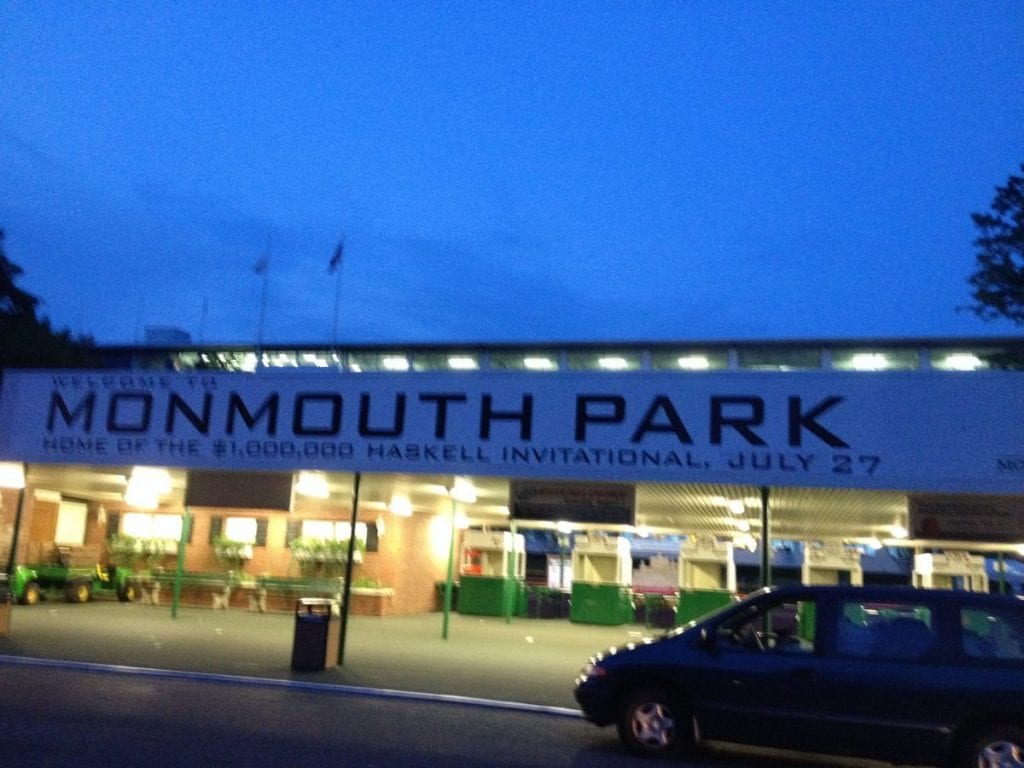
Good night, Monmouth. Photo by The Racing Biz.
by Jim Hague
Dennis Drazin is passionate about the idea that “exchange wagering” will be in place at Monmouth Park, which Drazin operates, by the beginning of March 2016.
“We’ve been looking for ways to attract the younger generation,” Drazin said in a telephone interview. “Exchange wagering was passed in 2010 unanimously by the New Jersey state legislature. For the past several years, we’ve been trying to find ways to make it become a reality. I do believe that this is a win-win for the horse racing industry and for Monmouth Park.”
Drazin’s company, Darby Development, which operates Monmouth Park on behalf of the New Jersey Thoroughbred Horsemen’s Association, which in turn leases the track from the New Jersey Sports and Exposition Authority, granted a conditional license to Betfair, the British-based owner of the Television Games Network (TVG), to begin the first exchange wagering operation in the United States.
If it comes to fruition in March like Drazin believes, then the future of Garden State horse racing could be altered considerably.
“We’re looking for a trial run from March through May, then be ready for sure when the Monmouth Park meet opens in May,” Drazin said.
The exchange wagering system enables bettors to post their own prices and accept bets from other customers. It also allows other facets to the wagering game never before offered in the United States.
“It also enables the bettor to bet on horses as the race goes on,” Drazin said. “Say you see a horse come out of the gate well or is closing well. You can still bet on it. If you don’t think you’re going to win with your initial bet, you can bet on another online at your computer screen or Smartphone. Most of these kinds of wagers appeal to the younger generation.”
It also enables horse players to bet against each other, head-to-head.
“Say you’re a savvy horse player and you see a horse that’s 5-to-2 in the morning line, but is 6-to-5 at the track,” Drazin said. “You can look to find someone who would be willing to take your bet at the odds you want. This enables you to set the odds. You can wake up and see if there are any takers for your bets against the morning line.”
Exchange wagering is extremely popular in the United Kingdom, but in that country, most wagering takes place through bookmakers. Bookmaking is illegal in most every state in the United States except four. Drazin, however, sees this as a different animal.
“It’s pari-mutuel exchange wagering,” Drazin said. “Different people call it different things. When I think of bookmaking, I think of a guy sitting by a telephone, taking bets on credit. It’s not what exchange wagering is. You have to have money in an account. It’s also fixed-odds wagering.”
In November, the New Jersey Racing Commission gave the final approval to allow exchange wagering to be offered at Monmouth Park.
“But there’s a lot of technology involved,” Drazin said. “So it’s going to take a while to get it up and running. It’s been in operation in Europe for several years. We’re set to be the first jurisdiction to have it here.”
Under the terms of the agreement, only New Jersey residents would be allowed to open accounts through NJBets.com and TVG.com, but bettors in the United Kingdom would be permitted to bet directly with New Jersey account holders.
Drazin said that the operation is very similar to the one-day fantasy leagues that companies like FanDuel and Draft Kings operate.
“Right now, 53 million people play daily fantasy games in the United States,” Drazin said. “It’s just a new fascinating part of other sports betting.”
Drazin is still hoping that a federal court will allow Monmouth Park to move forward with its plans to have the first sports betting parlor in New Jersey. An en banc hearing of the full U.S. Third Circuit Court of Appeals is expected to hear the state’s case February 17. That the Third Circuit agreed to hear the case after a panel of the Court had rejected the state’s efforts marked New Jersey’s first win on the legal front of the sports wagering battle.
“Right now, we have a facility that is closed from November through May,” Drazin said. “We can operate year-round, and I do believe that exchange wagering is the first step.”
Drazin believes that exchange wagering will eventually help horse racing.
“I think there will be extra purse money,” Drazin said. “I think a younger demographic will come out and participate. This will give our consumers a varied number of wagering options.”
New Jersey’s law requires that 50 percent of “exchange revenues retained by the exchange wagering licensee” be paid to overnight purses. It leaves up to the licensee, presumably through its contract with Darby, to determine what and how it charges consumers.
Drazin said that the neighboring states like Delaware, Pennsylvania and New York allow casino gambling at the race tracks, while New Jersey does not.
“That puts us at a competitive disadvantage,” Drazin said. “We have to offer something different. As of 2010, we no longer have a racing subsidy from the state to help with operations. We’re going to make sure the people wagering are from New Jersey and matching bets with people either in New Jersey or Europe.”
Monmouth Park will receive a revenue share in this operation, but that total is hard to predict without concrete numbers about possible gamblers. Drazin refused to comment on the deal between Darby Development and Betfair.
Betfair’s representatives did not return phone calls.
Only two states — California and New Jersey — have passed legislation approving exchange wagering since Betfair started to lobby legislatures to permit the practice.
California’s efforts have been stalled because no agreement can be reached over the percentages given to Betfair, horsemen and the racetracks.
Critics claim that the exchange wagering — especially wagering after a race goes off — encourages illegal practices like insider wagering and race fixing.
Exchange wagering allows players to bet on a horse to lose, which could give unscrupulous connections an immediate financial incentive to throw races. Betfair has insisted it closely monitors any suspicious illegal activity.
In any case, Drazin believes that the installation of exchange wagering will be a major boost to Monmouth Park’s productivity.
“We had to figure out a way to attract the younger generation,” Drazin said. “It’s proven to work in Europe. There’s a lot of new money out there.”














How did this guy Drazin go from being ” advisor ” to darby to being the head of darby?